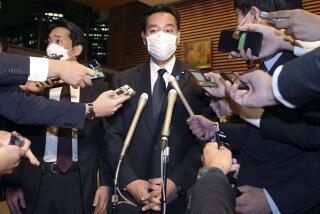Japan’s Top Bank Official Vows Tougher Regulation : Finance: Government promises to end traditional cozy relationship that led to Daiwa trading scandal.
- Share via
TOKYO — Battered by criticism of its handling of a $1.1-billion scandal at Daiwa Bank’s New York branch, Japan’s Finance Ministry declared Friday that it will move away from its traditional cozy relationship with the nation’s banks.
The ministry now wants to apply a more strict investigative and regulatory approach to its oversight, especially of the international activities of Japanese banks, spokesman Yukio Yoshimura told a news conference. It also will step up its cooperation with foreign supervisory authorities, he said.
The ministry announced that it is creating a special committee of high-level ministry officials to decide on specific steps to meet these goals, with decisions expected in about a month.
“I don’t think the study alone will quell overseas concerns” about Japan’s banking system, Finance Minister Masayoshi Takemura said, “but this is one of our efforts to erase such concerns.”
Takemura also called on the banks to “stop being sensitive to the ministry’s moods and stand on their own feet” and that the ministry “should refrain from making unnecessary interventions.”
Japan’s traditional approach proved a dismal failure in the Daiwa fiasco.
Last week, U.S. authorities filed a 24-count criminal indictment against Daiwa--the world’s 21st-largest bank and Japan’s 10th-largest--and ordered it to shut down its U.S. operations by Feb. 2. That step was prompted by Daiwa’s handling of the $1.1-billion bond-trading scandal, which the bank blames on a lone trader in its New York branch who allegedly made unauthorized trades for 12 years and finally confessed his actions to bank officials in late July.
Daiwa notified the Finance Ministry of the trading loss in early August and was told to conduct a more thorough investigation, according to statements by bank and ministry officials. U.S. regulators, however, were informed only in mid-September. U.S. authorities charge that at least during this period, Daiwa management engaged in an illegal cover-up of the losses. The bank pleaded innocent on Thursday in court action in New York.
Daiwa faces a maximum fine of more than $1 billion if convicted on all charges. In Japan, the punishment for violation of reporting obligations by a bank is only $5,000.
“We learned a valuable lesson from the incident of Daiwa, and the proposals . . . are based on the lessons from the Daiwa case,” Yoshimura said.
In the past, the Finance Ministry has issued frequent instructions to banks on a wide variety of matters, rather than giving them freedom of action within a set of rules and then policing them for violations.
And traditionally, when cases of wrongdoing were discovered in the banking industry, “the financial institutions themselves investigate the facts, then legal action is taken if necessary,” Yoshimura said.
In the future “it would be necessary to always maintain . . . tension and [an] arms-length relationship between the ministry and financial institutions,” according to Yoshimura.
In a written statement, the ministry said the new special committee on banks’ foreign activities will address such goals as:
* More frequent and closer exchange of information with foreign regulators.
* Tougher supervision of banks’ internal audits.
* New approaches to dealing with wrongdoing in financial institutions.
* More vigorous inspections by the ministry of Japanese banks’ overseas activities.
The ministry currently has 400 inspectors overseeing about 1,300 Japanese financial institutions. Of these, about 15 to 20 people work on supervision of overseas activities by Japanese banks.
The United States, with more than 10,000 deposit-taking institutions, has about 7,800 inspectors.
More to Read
Sign up for Essential California
The most important California stories and recommendations in your inbox every morning.
You may occasionally receive promotional content from the Los Angeles Times.












